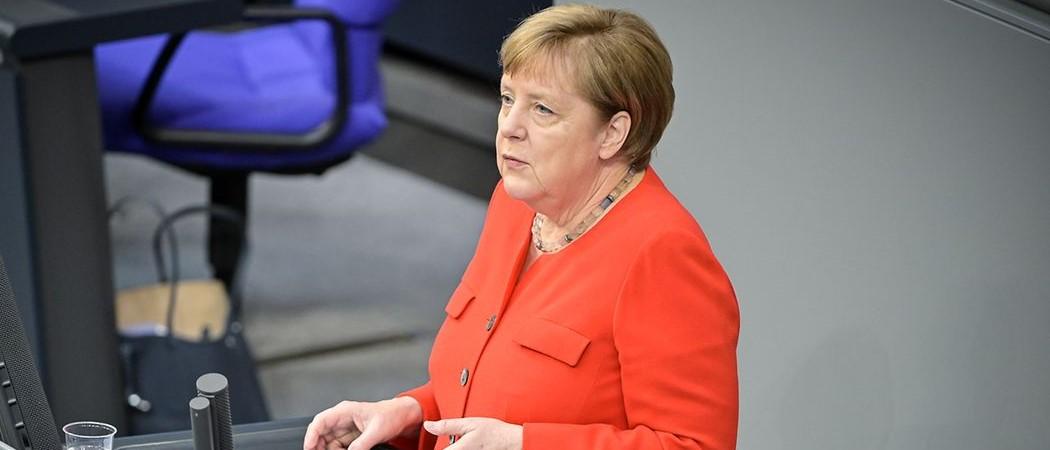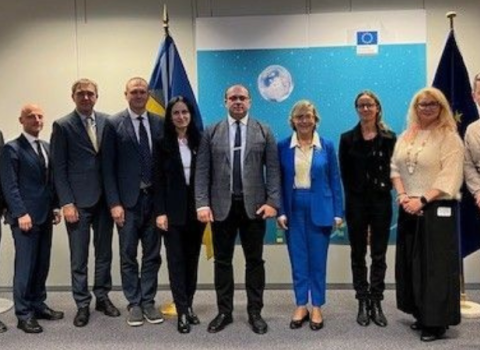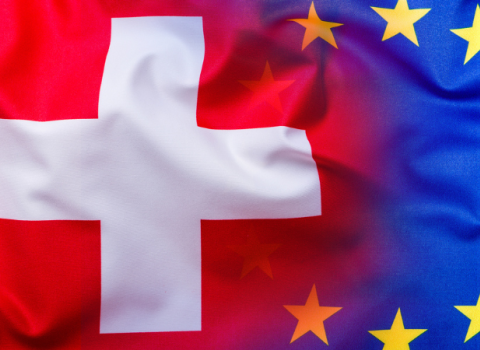The European Research Area and technological sovereignty top Germany’s agenda for its six-month stint at the helm of the council of the EU

Angela Merkel. Photo: German government, Bundesregierung/Denzel.
Germany is putting pandemic recovery, research and innovation and technological sovereignty at the centre of the agenda of its six-month stint at the helm of the Council of the European Union, and vows to push the EU budget over the finishing line by the end of the year.
In a document outlining the agenda of the council for the next 18 months, the incoming trio of member states to take over the presidency - Germany, followed by Portugal and Slovenia - have voiced their commitment to help reach an agreement on the EU’s next multiannual framework programme and to get major research legislation passed.
“European research, health and education systems must be ready to fully take on the challenge of technological and societal changes, also linked to digitalisation, fostering innovation for growth and jobs, by promoting research and innovation, improved performance in health and investments in people's skills and education,” the agenda says.
All three countries want to see a timely launch of the EU budget, but it will be up to Germany to do the heavy lifting and get the budget negotiations over the finish line by December.
Germany will also help broker deals with all member states on legislative files relevant to research and innovation, promising a “timely adoption” of legislation for Horizon Europe, the European Institute of Innovation and Technology (EIT), Erasmus+ and Digital Europe.
According to German officials, the presidency will also prioritise the setting of common European strategies to contain the pandemic and to come up with a coordinated lockdown exit strategy.
In addition, Germany wants to build consensus around a sustainable recovery, which includes an agreement on the EU budget and a €750 billion recovery fund proposed by the European Commission in May.
Germany’s R&D agenda
Sustained investment in research, innovation and education will play a key role for EU’s ability to respond to the pandemic and other future crises.
As one response to the coronavirus crisis, the three presidencies will push for the establishment of new joint research laboratories focused on drug and vaccine development under the European Commission’s science service, the Joint Research Centre (JRC).
The German presidency will also look into ways of boosting investments in research and innovation at the national level. Only 10 per cent of European research, development and innovation activities are funded by the EU, the rest are coordinated and funded nationally, and for a long time, Germany has been pleading for all member states to boost R&D spending to at least 3 per cent of GDP by 2020. Only a few countries have already reached that target.
The European Research Area (ERA), a longstanding plan to create a single market for research in the EU has been dusted off recently and put back on the agenda by EU research commissioner Mariya Gabriel. A revamped and more effective ERA could simplify the free circulation of researchers, scientific knowledge and technology across the bloc.
The upcoming trio of presidencies argues new ERA legislation could “maximise the full potential of research and innovation across the Union.”
Gabriel will put forward a proposal to reinvigorate ERA on 8 July, which the council will first discuss at a meeting of research ministers chaired by Germany on 21 July.
Whether Germany is able to push Horizon Europe legislation over the finish line by the end of this year will depend on how fast EU leaders can agree on the multiannual budget. Then, research ministers will have to agree on how the money will be distributed in Horizon Europe, which countries outside the EU will have access to it, and how the programme will work in sync with other EU funding schemes.
According to sources in the German government, a political agreement on association rules for could be reached in September, which will allow the EU to enter into negotiations with third countries.
In the meantime, the commission is still working on new ways of coordinating Horizon Europe with other funds.
Tech sovereignty
The pandemic has exposed Europe’s economic and medical vulnerabilities. Countries scrambled to import basic medical equipment from China and a coordinated EU plan to stockpile masks and ventilators was not put in place swiftly enough, as member states shut down borders and banned exports of critical products.
To prevent that from happening in the future, Germany is calling for a debate on whether Europe should pursue “technological sovereignty” so it won’t depend on other powers in future crises. At the same time, discussions in the council on a new climate law that seeks to halve EU’s carbon emission by 2030, and a coordinated plan to digitise the European economy, will continue.
The document presented by the three countries calls for EU to “further strengthen” its “digital sovereignty”.
To that end, over the next 18 months, the three presidencies will debate forthcoming proposals by the commission on “Shaping Europe’s Digital Future”, a white paper on artificial intelligence, a strategy for data and a digital services act.





 A unique international forum for public research organisations and companies to connect their external engagement with strategic interests around their R&D system.
A unique international forum for public research organisations and companies to connect their external engagement with strategic interests around their R&D system.